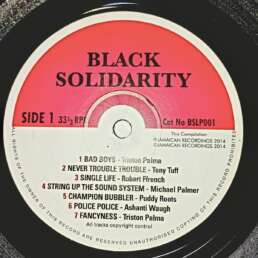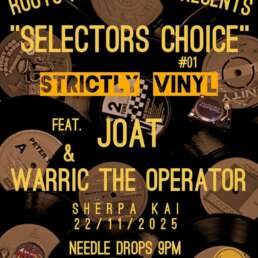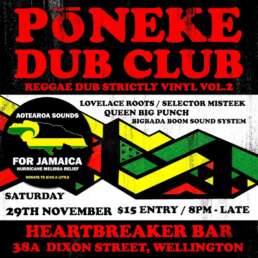Jamaican dub poet Nazamba, who’s also known by the moniker Wild Life, has been making major moves of late. First working with The Bug’s label Pressure on the “Vex” single in 2018, a collaboration with French sound system specialists O.B.F has resulted in a four-track release and now this self-titled debut album.
Nazamba brims with optimism. Gruff, yet almost tender, the truth speaker channels the spirit of those before him to take on the woes of society, while bringing a fresh and poignant vocal style. A masterful showcase of sonic dread, featuring two choice guests in Linval Thompson and Soom T, this will certainly remain a top surprise of the year, if not end up among the very best 2019 has to offer the reggaeverse.
Varyingly described as “the spirit of Prince Far I reincarnated” and “a modern-day playwright,” the gifted vocalist thoughtfully spoke about his musical works.
The Groove Thief speaks to Nazamba
TGT: Even though you’re quite honest with a lot of your lyrics, you’re still trying to look at the positives.
N: If you notice my poems, they are with solutions – you know what I mean? They are really balanced. Even though we might eke out at certain things, we know we have to live with the thing, without losing their head. We can live in the middle of the fire, and fix it. Without no problem, no politician – we just know that some time, them go out abound. We love them, our brother, our sister, same way. But when them wrong, we have to have the right to say ‘yo, you’re wrong.’ And when them right, we should say ‘yeah,’ can praise them and give thanks. It’s a balance thing, you know, peace and love.
TGT: Do you feel that’s your responsibility as a dub poet, this commentary on reality is a key part of who you are?
N: Yeah, because that is the root of dub poetry. So, even though we do album with a mix, covering topics, some different from social commentary, we have to have that sense. Like the tune “Politricks” with Soom T, even though the others are not that hard-hitting, but you have to have that, because that’s the foundation of dub poetry. Revolution, you know? Truth and rights, you know?
TGT: From your perspective, where’s the line between dub, reggae, and dub poetry?
N: Well, it’s still reggae you know? This is unique vision of reggae, so this is the only music like this, because dub poetry is really reggae. The artists, they chant in a different way, they don’t really sing, musically talk. You know what I mean? Like Mutabaruka, you know? That’s dub poetry, but it’s on reggae riddims, mostly. It’s a reggae thing, so it’s really reggae. So dub poetry is a part of reggae like rub-a-dub reggae, dancehall reggae – reggae’s so unique, it’s got a lot of of other strong genres which attach to it.
TGT: What first brought you to dub poetry, out of all these sub-genres of reggae?
N: Well, I was always listening to dub poetry, always. We listen to Muta, we grew up on Muta, others, legends, you know? Linton Kwesi a lot, but me never think that I would become a dub poet. I’ve been writing poetry too, from long time, writing short stories, writing songs, but never think about recording dub poetry, just always sing and deejay. Some of the things in Wild Life, so up on a tour in Europe and meet Rico, O.B.F, and him say Wild Life we’ll have an album coming a road, ‘we wanna do like a movie track for the intro of the album’. I say ‘yeah, man,’ so we go the studio and we do it.
And couple of days after him come to me and say ‘Wild, trust me, the thing you do there, I feel like we could do a dub poetry album.’ You know, immediately, we kinda feel it because the idea come to me right away too. Him bring it to me and me say ‘OK, yeah we can do it!’ We did one song in his studio before I come back to Jamaica. So Rico, really, 2017, discovered the dub poetry parts, ignite my mind to the part there, so give thanks you know, it’s a part of music, and I feel comfortable, too.
TGT: That’s so cool that recording something quickly has led to a bigger project.
N: Right, right, that’s what happened – it was crazy. So, I said ‘me love dub poetry, but I don’t wanna go back to the old time, ancient story-telling, old-time Anansi-style, me gonna bridge it now, with a new flavor. So if you notice, we’re trying to keep the thing unique, even lyrics, we try to make it unique, we don’t want to make it like every day. Because we’re basically saying the same thing – it’s about how you say it, you write different. Still the same words, in a different way, so that some people can understand.
TGT: It’s interesting how the dub poetry is paired with such heavyweight sound system productions.
N: Yeah, that was basically influenced from Rico, he owns a sound system, you know, and he’s a producer, so where the sound influences him. Talking about the experience of the dance, that’s how I came up with those poems [laughs]. “The Groove” about letting the music… being a sound system man influenced those things on the album… he’s not an easy man to please. Respect due to all the producers that think this way, they have the things set in their head that they want, set it, so when them get it back, they expect it, to hear first… and me feel comfortable on this side, delivering it.
So we are connected, we aim to please, we have to be perfect, you have to try to be the best you can every time, so we don’t want anyone to complain, we want people to love it. Every track on the album was like ‘yeah, yeah, yeah! what, what, what!’ That’s how we do it, not just mediocre, we push it…
Give thanks, this is what the music was aimed to be. More than money, the reggae music is one of the most united force in the universe. All the Japanese come to Jamaica for reggae; 99% of the Europeans come to Jamaica for reggae; and then in return, we go there and people start relationships and business and it grows. So reggae music is responsible for most of the growth a gwaan out of Jamaica. That’s how powerful reggae music is. So we give thanks to everyone, to you and I, too.
TGT: Big ups! I’m curious, the nine tracks on here really have their own vibes. Which ones are your favorites?
N: I have one favorite: [sings] Awww, yeah, what a sound play sweet, what a sound play sweet – my tune that you know, yeah, that wicked, you know, yeah, me love it! It’s my song from the album [laughs].
TGT: Is that one of the most positive tracks on the album then?
N: All of them is equally positive, because we go for the deep positive vibes, but maybe some poems have different flavors, so maybe you’re not feeling certain flavors but other people will feel it – go for different styles. The track with Soom T was fast, you know? Just listen to them deeply. You have to sit down, give it some time, relax, and make it play and just listen. Reason with a friend, inspect it and listen properly – yeah! Words, brand new words you know – concrete plantation – brand new term, we try to go real deep.
TGT: You’re able to take a simple concept and reveal that it’s not so simple… un-peel the fruit in a way?
N: Mm-hmm. This is from long before I come to town… we realize that everything is a story, I’m from a part in Jamaica where one of the greatest poets are from, Claude McKay, just a couple of miles… so we grow up learning about Claude McKay even before we start go to school. So we understand poetry, poetry is like 1, 2, 3, 4, 5, like straight along the line and tell a story, and get the people interested in the story. You understand me? Therefore I write all of my songs and all of my poetry just like that. Straight, one story. If you stop halfway, you might miss something [laughs].
TGT: What inspired the Nazamba name?
N: 2013 I went on a short tour [as Wild Life] in Zimbabwe, stayed some time in South Africa, on that trip we met some guys from Africa who play in the Azania band – from Cape Town, big band. The guys say ‘Wild Life, from Jamaica, well we have a name for you man – you are King Nazamba.’
From South Africa to Zimbabwe, they start calling me Nazamba, so when we went to Europe, fast forward now, and we plan to do the album of dub poetry, Rico come, ‘we want a name, an African name’ – ‘Me a gwaan already man, from 2013 me get one, I’m Nazamba’ – ‘yeah man, love it, it fits, this is the right name for you now!’ We check on the meaning, from all the different sections of Africa, universally positive – a river in Mozambique, named Nazamba, a sacred river. This is me, getting my platform now to reveal what really I come to do on the Earth. We give thanks.
TGT: And are there tour plans with O.B.F?
N: Yeah man, Nazamba and O.B.F just going to do our first tour in November this year, through South America, through Europe, and Africa. You know Wild Life’s out there, but right now we focus on Nazamba…
Nazamba review by The Groove Thief
Riding in on a wave of positive unity, there’s a real sense of ancient mysticism within “Africa.” Rather than telling ‘this sad story,’ Nazamba is certain of the continent’s ability to ‘remain in her glory,’ seeing ‘Africa rising.’ Then “The Hills” smashes in, Linval Thompson’s tenor hook working wonders alongside the dub poet’s vocal depth. Praising a natural life, life in the Jamaican hills specifically, this is ultimately a call for civilization to return to its foundations.
‘Sound man seh him want fi him pon dub because him want him name fi call, because him know this one is gonna be a boomshot in the dancehall’ essentially sums up the “The Groove,” a standout tune to say the least. O.B.F crafts a gem here, entrancing and weighty: the late-night dance hall summoned, full force. Then “Play Sweet,” over a thick take on the Drum Song Riddim, provides a poignant moment. Paired with a stellar Kojo Neatness, Nazamba speaks of the power of music, effectively realizing the potentiality he speaks of.
“Run!” returns to the minor tinges heard in Africa, yet here those with guns are taken to task, in far more specific detail than the average anti-violence ode. The tune ends with no confusion – ‘it’s wrong to kill another human.’ Interweaving a bit of wordplay, the ensuing “Medication Tree” is a hypnotizing dedication to high-grade herb.
A rather unexpected pairing, it’s wonderful to hear Soom T spitting pure lyrical heat from the first beat of her guest spot on “Politricks;” rapid-fire, layered, and heady, she provides a stellar contrast to Nazamba’s grim delivery. Part sonic cemetery, part indictment. Connecting mind to heart to part, “Badmind” is pure poetry. Teases of a rhythm poke out from the dub haze, but no beat ever emerges.
Closer “People” combines a minimal digital beat with words straight from the heart. Comparisons abound, as the vibes swirl around. An experimental closer in a sense, it references back nicely to the influential On-U.
More info:
Nazamba Bandcamp
The Groove Thief
.the future of dub is the present.
Exclusive Reviews + Interviews // Facebook // Mixcloud (Archive) // SoundCloud
Co-Founder: Pomegranate Sounds
Owner/Operator: Pomegranate Hi Fi
Writer: NiceUp
Editor: Global Reggae Charts Magazine
Related posts
Triston Palma – Bad Boys – Track of the Week
November 17, 2025
Selectors Choice – Sat 22 Nov
November 12, 2025
Pōneke Dub Club – Sat 29 Nov
November 11, 2025




